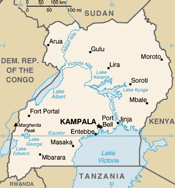KAMPALA, Uganda -- Patricia Kyazze sits at her desk amid the hanging oriental rugs, plush leather couches and sleek, glass-topped coffee tables of Nina Interiors, one of the Ugandan capital's most upscale furniture outlets. Faraway from the political turmoil in neighboring Kenya, the bedroom and dining room displays bespeak calm and money -- fitting for a city that's seen two decades of political stability and economic growth. But with 90 percent of Uganda's imports coming through Kenya's Mombasa port, maintaining this growth and stability is becoming increasingly difficult. For about a month now, three of the furniture company's containers, carrying furnishings made in places like Dubai and Malaysia, have been stuck at the port. "Some of these goods have been bought on borrowed money and we haven't even received them," says Kyazza, shaking her head. "Time is of the essence." Kenya's political violence -- which has killed about 1,000 people since late December's rigged elections -- is distressing economies throughout East Africa, and threatening to take a swipe at neighboring GDPs if the instability continues into the next few months.
Kenya Violence Hurts Trade Flows in Uganda, Throughout East Africa

